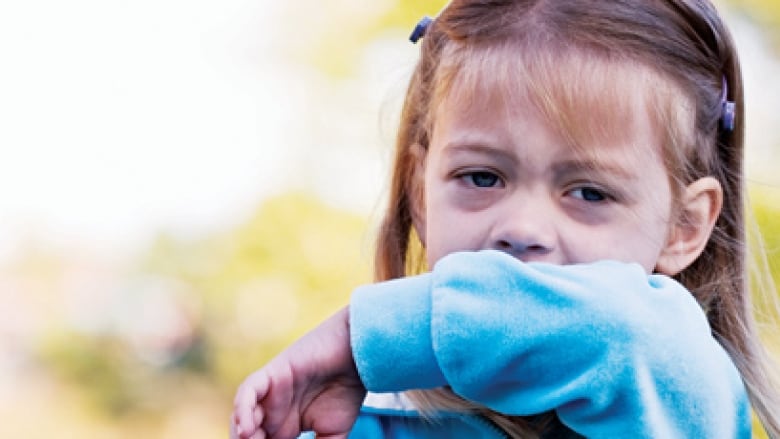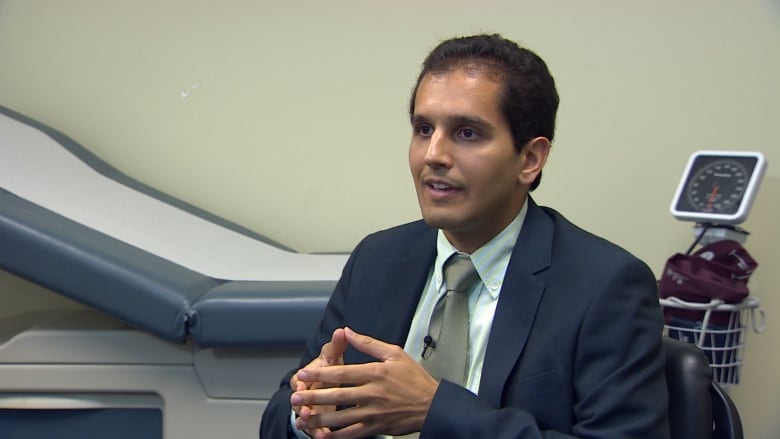Whooping cough outbreak declared in southern Manitoba
Increase in vaccine-preventable illness comes as immunization rates drop, especially in rural areas: province

An outbreak of pertussis, also known as whooping cough, has been declared in the Southern Health region, Manitoba Health says in a news release.
As of Friday, there were 154 confirmed or probable cases of the highly contagious, vaccine-preventable illness across Manitoba, with 152 of them in the Southern Health region, which covers south-central and southeastern areas of the province.
Most of the cases 80 of them were in children ageone to nine, the province's release said. The rest were spread out across infants one year or younger (30 cases), kids age10 to 19 (24 cases) and adults (20 cases).
The last time there was close to the same number of whooping cough cases was in 2012, when there were 118, Dr. Davinder Singh, medical officer of health for Southern Health, told host Marcy Markusa on CBC Radio'sInformation Radio.
"If we adjust for the change in how Manitoba's population has grown, that would be about 127 cases today," said Singh, who's also one of the vaccine leads for Manitoba's immunization program.
"So we've already passed that number, and there's obviously a lot of the year left to go."
In a letter sent to health-care providers in March, Manitoba Health said a small cluster of cases had been reported in the Southern Health region, as the province saw a decrease in vaccination rates compared to pre-pandemic levels for several infant and pre-school immunizations particularly in rural areas.
The list of vaccines with loweruptake rates included one that protects against whooping cough.
While the illness can affect people of all ages, infants one year and younger are at the highest risk of severe complications, including periods of stalled breathing, pneumonia, seizures, brain swelling and death.
Dr. Christopher Labos, a Montreal-based epidemiologist and cardiologist, says physicians across the country are becoming accustomed to a "frustrating" cycle of outbreaks of preventable and treatable diseases, which typically occur within small pockets of the country that have low vaccination rates.
Vaccines often become the victims of their own success, he said, because they can leadpeople with no living memory of once-prevalent diseases tounderestimate the importanceof getting their shots.
"The problem is that when vaccination rates slip, there's always the potential for these infections to have resurgences," he told host Faith Fundal during a Monday interview with CBC Radio's Up to Speed.

Catching and treating whooping cough early with antibiotics can lead to an easy recovery, said Labos, and infected people should stay home and limit their contacts to avoid spreading it further.
However, aftereffects of the pandemic, alack of family doctorsand increasing wait times in emergency rooms can causethose infected to avoid seeking care until the disease has progressed, he said.
"This is a preventable disease that is easily treatable. We just have to have our health-care system working properly to number one: prevent it, and number two: treat it when it actually happens."
Manitoba Health sent follow-up letters earlier this month to parents and caregivers of children born in 2019, 2020 and 2021 who may have missed routine childhood vaccines as the COVID-19 pandemic interrupted routine health care, according to the province.
Whooping cough is caused by a bacteria and commonly spreads through respiratory droplets in the air from coughing or sneezing. It's most contagious during the initial stages of the illness, the province's release said.
Symptoms are at first similar to those from the common cold and usually appear seven to 10 days after exposure.
No deaths reported so far
The disease often starts with a mild fever, runny nose and cough, and can lead to serious coughing fits lasting one to 10 weeks. Those fits can cause difficulty breathing, choking and vomiting. Infants may also have poor feeding, the release said.
Whooping cough is difficult to diagnose since it does not have many characteristic features, except for the cough itself, which is present in over 90 per cent of cases, said Labos.
Seventy-eight of the latest cases were in females and 76 were in males. They resulted in 55 emergency department visits and two admissions to pediatric intensive care but no deaths have been reported, the province said.
Pregnant people in their third trimester are also at a higher risk of complications, according to the province.
The number of cases reported varies from year to year and typically peaks every two to five years, the province said. An outbreak can be declared when there's a higher number of cases reported in a specific area than expected over a specific time period.
Vaccine outreach efforts
Health-care providers and public health teams in the Southern Health region areworking to reach out to and build relationships with families following service disruptions and other effects of the pandemic. That includes seeing if they have questions, need information or face barriers to immunization.
Public health offices in the region have also offered evening clinic appointments and more time slots to make vaccination more convenient and accessible for families.As well, posters have been distributed to child-care facilities in the area, encouraging families to reach out to public health and make sure their kids' vaccines are up to date.
The province said immunization is the best way to prevent whooping cough, reduce the risk of severe symptoms and help limit the illness's spread.
The vaccines that protect against the illness are safe, effective and part of Manitoba's recommended routine childhood immunization schedule.
It's recommended that kids get their shots at two, four, six and 18 months, then between the ages of four and six and in Grade 8 to 9 for best protection. The vaccine is also recommended for all pregnant people, the province said.
Anyone who is uncertain about or has questions or concerns about immunizations is encouraged to speak to their health-care provider or public health office. More information is also available by calling Health Links-Info Sant at 204-788-8200 or toll-free at 1-888-315-9257.
People with symptoms of whooping cough should see their health-care provider.
With files from Wendy Parker












_(720p).jpg)


 OFFICIAL HD MUSIC VIDEO.jpg)
.jpg)



























































































